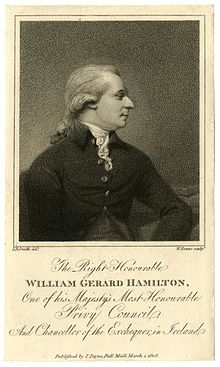William Gerard Hamilton
|
The Right Honourable William Gerard Hamilton PC (Ire) |
|
|---|---|
 |
|
|
Member of Parliament for Haslemere (1790–1796) Wilton (1780–1790) Wareham (1774–1780) Old Sarum (1768–1774) Pontefract (1761–1768) Petersfield (1754–1761) |
|
|
In office 1754–1796 |
|
| Chancellor of the Exchequer of Ireland | |
|
In office 1763–1784 |
|
| Preceded by | Lord Yorke |
| Succeeded by | John Foster |
| Chief Secretary for Ireland | |
|
In office 1761–1764 |
|
| Member of Parliament for Killybegs | |
|
In office 1761–1768 |
|
| Personal details | |
| Born | 28 January 1729 London, Great Britain |
| Died | 16 July 1796 (aged 67) London, Great Britain |
| Resting place | St Martin-in-the-Fields, City of Westminster, London |
| Education | Winchester College |
| Alma mater | Oriel College, Oxford |
| Religion | Church of England |
William Gerard Hamilton (28 January 1729 – 16 July 1796), English statesman and Irish politician, popularly known as "Single Speech Hamilton," was born in London, the son of a Scottish bencher of Lincoln's Inn.
He was educated at Winchester and at Oriel College, Oxford. Inheriting his father's fortune he entered political life and became Member of Parliament for Petersfield in Hampshire. His maiden speech, delivered on 13 November 1755, during the debate on the address, which excited Walpole's admiration, is generally supposed to have been his only effort in the House of Commons. But the nickname "Single Speech" is undoubtedly misleading, and Hamilton is known to have spoken with success on other occasions, both in the House of Commons and in the Irish parliament.
In 1756 he was appointed one of the commissioners for trade and plantations, and in 1761 he became chief secretary to Lord Halifax, the Lord Lieutenant of Ireland, as well as MP of the Irish House of Commons for Killybegs (until 1768) and English MP for Pontefract.
He was appointed Irish Chancellor of the Exchequer in 1763, and subsequently filled various other administrative offices. Hamilton was thought very highly of by Samuel Johnson, and it is certain that he was strongly opposed to the British taxation of America. He was close to the Prince Regent, serving as a trusted adviser. In 1784 he exchanged his office as Chancellor of the Exchequer for a pension of £2,000 p.a. Hamilton had held the office for over 20 years, although had treated the role as a largely ceremonial position. He was succeeded by John Foster, who went on to bring in changes credited with greatly boosting the rural Irish economy.
...
Wikipedia
